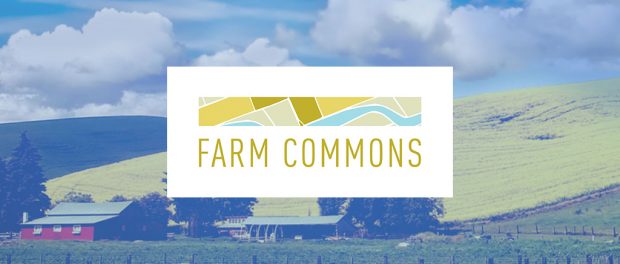Common Farm Law Issues Tip Sheets

Farm Commons has 6 new tip sheets available to help farmers and their advocates get up to speed on common farm law issues.
Download them for free at the Farm Commons website. While you are there, check out all their resources on sustainable farm law and common farm law issues.
These tip sheets on common farm law issues are ideal for agriculture professionals and advocates to hand out to farmer clients, while being just as useful to farmers themselves. Again, all our educational resources are free. Farm advocates, especially, please be in touch if there are additional farm law resources you need to serve your farmer clients with accurate, specialized legal education materials.
Succession Planning: Where do you begin? From conservation easements, family trusts, and LLCs to capital gains, estate taxes, and gift taxes, it can be easy to get overwhelmed. Start here for some tips to turn overwhelm and idleness into inspired action.
Why Form an LLC?: Creating and maintaining an LLC for your farm business requires some extra expense and effort. How do you know if it’s worth it? A wise approach is to consider whether the benefits outweigh the costs. This tip sheet helps farmers do just that with a series of questions.
The Lease: Who is Responsible for What? Farmers and landowners are pretty much free to divvy up responsibilities however they want under a lease agreement. Nevertheless, knowing what is customarily done can be helpful during the negotiation process. This tip sheet offers guideposts to common practices.
Farm Insurance: The last thing any farmer wants is to be stuck with no insurance after a catastrophic incident occurs; even worse is to be stuck with no coverage despite having insurance! This tip sheet discusses risk and return when seeking insurance for a farm businesses so you can decide on the best approach for you.
Dealing with Regulators: Whether it’s installing a wastewater treatment system, upgrading facilities, or adding a new venture, farmers don’t always agree with regulators. Laws and regulations often seem riddled with ambiguities and shifting interpretations. Here are some tips for strategically working with regulators to resolve issues.
Value-Added Agritourism and Taxes: Farmers often see their value-added and agritourism ventures as related to and even an essential part of their overall farm operation. However, the law doesn’t always see it that way. When it comes to federal income taxes, the IRS treats “farming activities” and “non-farming activities” differently.
Farm Commons also has six other new tip sheets on common farm law issues, which offer some information specific to Minnesota and Wisconsin, but are relevant to farmers in any state.
Chemical Drift Response: For an organic farmer, it can be frustrating to hear the sound of a crop duster flying overhead or see ground sprayers out in force in the neighbor’s crops. Chemical drift happens. This tip sheet provides an overview of the law and outlines steps farmers can take if their farms fall victim to chemical drift.
Chemical Drift Prevention: Chemical drift can be especially problematic for farmers who value their crops as certified organic or chemical free. What can be done to prevent it? This tip sheet identifies proactive ways farmers can safeguard their farm.
Payroll Taxes: How do you know when to pay which taxes for your employees? It can seem like a maze. These flowcharts will help farmers identify whether and when payroll taxes kick in, and are especially useful for diversified and direct to consumer farmers in navigating complex regulations.
Fence Law: Discrepancies between new property surveys and longstanding boundary lines are ever more frequent. What does this mean for the farmer who’s told that a new survey shows that the boundary cuts into their side of a longstanding property line? Farmers have options, discussed in this tip sheet.
Value-Added Agritourism Without a License: Many beginning and experienced farmers want to expand their activities by hosting events and offering food products at events or for sale. Food service is a regulated venture, however farmers may find narrow exemptions that apply to them.
Lease Terminations: Any farmer leasing farmland is likely concerned that the landlord will suddenly decide to terminate the lease early. What, if anything, can the farmer do to protect her or his operation? This tip sheet sheds light on Minnesota and Wisconsin laws, which mirror national trends for addressing lease termination.
Farm Commons is a 501c3 charitable organization that helps sustainable farmers become stable and resilient. Farm Commons works within communities to empower sustainable farmers in matters of transactional law, including land leasing, sales, employment law, business structures, insurance/liability, and value added ventures. Access a wealth of free legal education resources at our website anytime: www.farmcommons.org. Be in touch if you would like to partner to empower farmers in your community.
These resources were developed with the support of a North Central SARE Professional Development grant.
Find more farm production resources from beginningfarmers.org below:








 Your Privacy Choices
Your Privacy Choices
Leave a comment